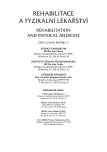Organization of Rehabilitation with Use of ICF (International Classification of Functioning, Disability and Health WHO), Assessment of Degrees of Disability According to Qualifiers)
Authors:
O. Švestková; J. Pfeiffer; Y. Angerová; Petra Sládková
Authors‘ workplace:
Klinika rehabilitačního lékařství 1. LF UK a VFN, Praha
přednostka doc. MUDr. O. Švestková, Ph. D.
Published in:
Rehabil. fyz. Lék., 17, 2010, No. 2, pp. 43-50.
Category:
Original Papers
Overview
ICF is the theoretical guideline of the modern rehabilitation, which starts to be very important, so far the possibilities of medicine and lifesaving of very serious cases are more successful. Introducing rehabilitation highly improve the perspectives of individuals who need to reach the highest possible level of functioning. It is the matter of rationality, ethical principle, which is also cost effective. The important task is to assess qualifiers and determine degree of disability.
Key words:
ICF, domains, qualifiers
Sources
1. ALMANSA, J., GARIN, O., CHATTERJII, S., VILLALONGA-OLIVEST, E., ALONSO, J., VALDERAS, J., MORENO, M., AYUSO, J., DIETA, A., LEONARDI, M., SVESTKOVA, O., BURGER, H., RACCA, V., FRANCESCUTTI, C., VIETA, E., FERRER, M.: The International Classification of Functioning, disability and health (ICF): Quantitative measurement of Capacity and Performance“. Newsletter, WHO Family of International Classification (FIC), 6, 2008, 1, s. 5-7.
2. ANGEROVÁ, Y., ŠVESTKOVÁ, O., SLÁDKOVÁ, P.: Practical using of ICF of patients with multiple sclerosis, MHADIE. Abstract Book, 5th World Congress of the International Society of Physical and Rehabilitation Medicine, 13.-17 June 2009, Istanbul, Turkey, s. 155.
3. ANGEROVÁ, Y., ŠVESTKOVÁ, O., SLÁDKOVÁ, P.: Preparing of ICF Core sets for patiens after TBI. Abstacts from the Seventh Congress on Brain Injury, April 2008, Lisabon, Portugal, Brain Injury, 22, 2008, 1, s. 126.
4. ELDAR, R., KULLMAN, L., MARINCEK, C., SEKELJ-KAUZLARIČ, K., ŠVESTKOVÁ, O., PALAT, M.: Rehabilitation medicine in countries of central/eastern Europe. Disability and Rehabilitation. Taylor§Francis, London, England 30, 2008, 2, s. 134-141.
5. LIPPERTOVÁ-GRŰNEROVÁ, M.: Neurorehabilitace. 1. vyd., Praha, Galen, 2005, 350 s.
6. LIPPERTOVÁ-GRŰNEROVÁ, M., ŠVESTKOVÁ, O., PFEIFFER, J.: Včasná neurorehabilitace po těžkém traumatu mozku. Česká a slovenská neurologie a neurochirurgie, roč. 62, 2006, 4, s. 302-307.
7. PFEIFFER, J., ŠVESTKOVÁ, O.: Jak pracovat s MKF (Mezinárodní klasifikací funkčních schopností, disability a zdraví). Rehabil. fyz. Lék., 16, 2009, 2, s. 47-52.
8. PFEIFFER, J, ŠVESTKOVÁ, O.: Mezinárodní klasifikace funkčních schopností, disability a zdraví: MKF. Překlad z originálu International Classification of Functioning, Disability and Health: ICF, World Health Organization 2001. 1. vyd., Praha, Grada Publishing, 2008, 280 s.
9. SCHUNTERMANN, M.: Die Internationale klassifikation der funktionfähigkeit, behinderung und gesundheit (ICF) der weltgesundheitsorganisation (WHO) online, [cit. 2007-05-30], dostupné z : http://deutsche-rentenversicherung-bund.de/.
10. STUCKI, G., CIEZA, A., ESERY, T., KONSTANJSEK, N., CHATTERJI, S., BEDIRHAN ŰSTŰN, T.: Application of the International Classification of Functioning, Disability and Health (ICF) in clinical practise. Disability and Rehabilitation, 2002, 5, s. 281-282.
11. SUSSOVÁ, J., ŠVESTKOVÁ, O., ŠÁCHOVÁ, I.: Rehabilitation care in paediatrics in the Czech Republic. Pediatric Rehabilitation, Taylor&Francis, London, 9, 2006, 2, s. 119-121.
12. ŠVESTKOVÁ, O., ANGEROVÁ, Y., BRTNICKÁ, P.: Practical using of ICF of patients after TBI, 9th Congress of European Federation for Research in Rehabilitation 2007. Medimont, Bologna, Italy, s. 95-99.
13. ŠVESTKOVÁ, O., ANGEROVÁ, Y., LIPPERTOVÁ-GRŰNEROVÁ, M., SLÁDKOVÁ, P.: Practical using of ICF of patients after TBI, MHADIE. Abstract Book, 5th World Congress of the International Society of Physical and Rehabilitation Medicine, 13.-17. June 2009, Istanbul, Turkey, s. 284-285.
14. ŠVESTKOVÁ, O., ANGEROVÁ, Y., PFEIFFER, J.: Hodnocení zdraví, disability v Evropě. Eurorehab, 16, 2006, 3, s. 117-120.
15. ŠVESTKOVÁ, O., ANGEROVÁ, Y., SLÁDKOVÁ, P.: Correlation between subjective nad objective parametr of the patient after TBI (using ICF and WHODASII). Abstacts from the Seventh Congress on Brain Injury, April 2008, Lisabon, Portugal, Brain Injury, 22, 2008, 1, s. 113.
16. ŠVESTKOVÁ, O.: Conceptual basis of a legal framework for rehabilitation in the Czech Republic – a proposal. Disability and Rehabilitation, 24, 2002, 1, s. 798-780.
17. ŠVESTKOVÁ, O.: International classification of functioning, disability and health of world health organization (ICF). Prague Medical Report, Universita Karolina Pragensis, 109, 2008, 4, s. 268-274.
18. ŠVESTKOVÁ, O., PFEIFFER, J., KUPKOVÁ, J., MATLASOVÁ, H.: Mezinárodní klasifikace funkčních schopností, disability a zdraví WHO jako nástroj moderní rehabilitace. Praktický lékař 88, 2008, 3, s. 161-165.
19. ŠVESTKOVÁ, O., PFEIFFER, J.: Funkční hodnocení (diagnostika) v rehabilitaci. Praktický lékař, 89, 2009, 5, s. 268-271.
20. WHO: International Classification of Functioning, Disability and Health: ICF. World Health Organization, Ženeva, WHO, 2001. 280 s.
Labels
Physiotherapist, university degree Rehabilitation Sports medicineArticle was published in
Rehabilitation & Physical Medicine

2010 Issue 2
- Hope Awakens with Early Diagnosis of Parkinson's Disease Based on Skin Odor
- Deep stimulation of the globus pallidus improved clinical symptoms in a patient with refractory parkinsonism and genetic mutation
-
All articles in this issue
- Organization of Rehabilitation with Use of ICF (International Classification of Functioning, Disability and Health WHO), Assessment of Degrees of Disability According to Qualifiers)
- Assessment of Muscle Activation Patterns during Gait with Below-knee Prosthesis – Differences between Classic and Dynamic Foot
- Effects of Treatment with Biosynchron 500 on Motor a Non-motor Symptoms in Patients with Parkinson Disease – Results of a Randomized Study
- Results of Physiotherapy According to „Ostrava Concept” in Female Patients with Urine Incontinence
- Evaluation of Motoric Defects in Childhood
- Hallux Valgus from the Physiotherapist Standpoint or Is Hallux Valgus Just a Hallux Deformity?
- Rehabilitation & Physical Medicine
- Journal archive
- Current issue
- About the journal
Most read in this issue
- Hallux Valgus from the Physiotherapist Standpoint or Is Hallux Valgus Just a Hallux Deformity?
- Evaluation of Motoric Defects in Childhood
- Effects of Treatment with Biosynchron 500 on Motor a Non-motor Symptoms in Patients with Parkinson Disease – Results of a Randomized Study
- Organization of Rehabilitation with Use of ICF (International Classification of Functioning, Disability and Health WHO), Assessment of Degrees of Disability According to Qualifiers)
